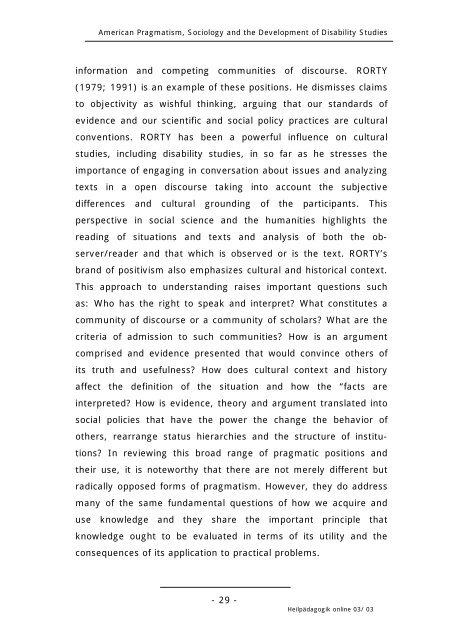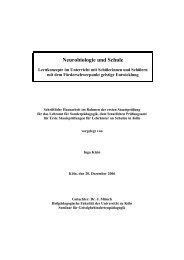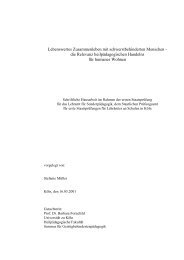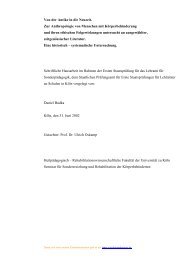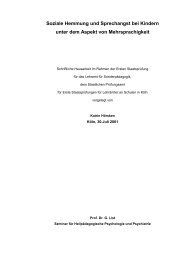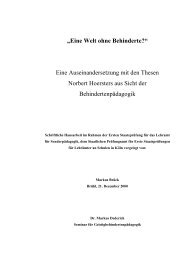Heilpädagogik online - sonderpaedagoge.de!
Heilpädagogik online - sonderpaedagoge.de!
Heilpädagogik online - sonderpaedagoge.de!
Erfolgreiche ePaper selbst erstellen
Machen Sie aus Ihren PDF Publikationen ein blätterbares Flipbook mit unserer einzigartigen Google optimierten e-Paper Software.
American Pragmatism, Sociology and the Development of Disability Studies<br />
information and competing communities of discourse. RORTY<br />
(1979; 1991) is an example of these positions. He dismisses claims<br />
to objectivity as wishful thinking, arguing that our standards of<br />
evi<strong>de</strong>nce and our scientific and social policy practices are cultural<br />
conventions. RORTY has been a powerful influence on cultural<br />
studies, including disability studies, in so far as he stresses the<br />
importance of engaging in conversation about issues and analyzing<br />
texts in a open discourse taking into account the subjective<br />
differences and cultural grounding of the participants. This<br />
perspective in social science and the humanities highlights the<br />
reading of situations and texts and analysis of both the observer/rea<strong>de</strong>r<br />
and that which is observed or is the text. RORTY’s<br />
brand of positivism also emphasizes cultural and historical context.<br />
This approach to un<strong>de</strong>rstanding raises important questions such<br />
as: Who has the right to speak and interpret? What constitutes a<br />
community of discourse or a community of scholars? What are the<br />
criteria of admission to such communities? How is an argument<br />
comprised and evi<strong>de</strong>nce presented that would convince others of<br />
its truth and usefulness? How does cultural context and history<br />
affect the <strong>de</strong>finition of the situation and how the “facts are<br />
interpreted? How is evi<strong>de</strong>nce, theory and argument translated into<br />
social policies that have the power the change the behavior of<br />
others, rearrange status hierarchies and the structure of institutions?<br />
In reviewing this broad range of pragmatic positions and<br />
their use, it is noteworthy that there are not merely different but<br />
radically opposed forms of pragmatism. However, they do address<br />
many of the same fundamental questions of how we acquire and<br />
use knowledge and they share the important principle that<br />
knowledge ought to be evaluated in terms of its utility and the<br />
consequences of its application to practical problems.<br />
- 29 -<br />
Heilpädagogik <strong>online</strong> 03/ 03


